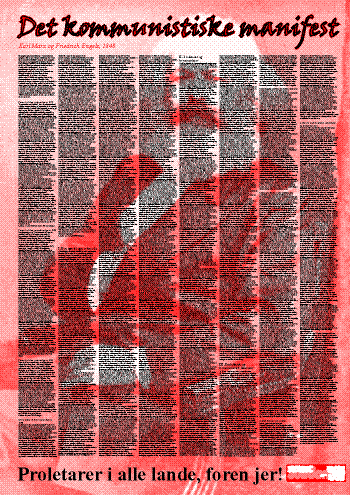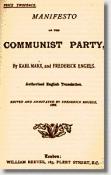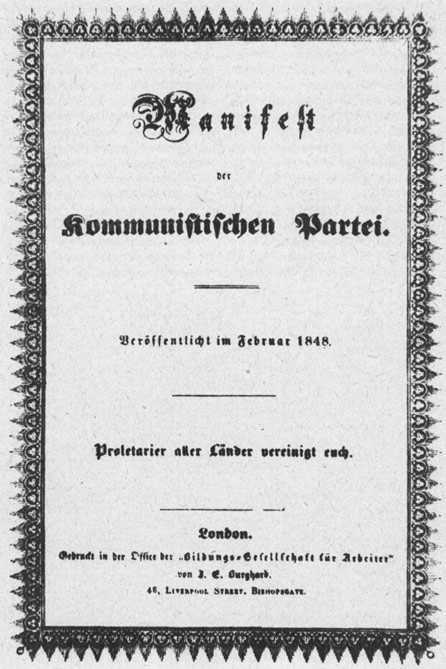Emneliste med bibliografisk og historisk materiale, samt aktuelle analyser af Det Kommunistiske Manifests politiske betydning i dag.
Forord
“Et spøgelse går gennem Europa – kommunismens spøgelse.” Sådan starter Karl Marx og Friedrich Engels pjece Det Kommunistiske Partis Manifest, som blev udgivet i februar 1848, og som siden er blevet verdens mest læst politiske skrift. I anledning af 160-året har vi lavet denne emneliste med bibliografisk og historisk materiale, samt aktuelle analyser af Manifestets politiske betydning i dag.
Online-udgaver af Manifestet på Marxisme Online, Marxistisk Internet Arkiv, Revolution.dk, Leksikon.org og nyere trykte udgaver kan bl.a. købes hos Modstand.org, Det lille Forlag, Forlaget Marx og Forlaget Arbejderen.
Bjarne A. Frandsen
Februar 2008
Revideret ifm. 175-året, februar 2023.
Se også på Socialistisk Bibliotek:
- Emneoversigten: Marxisme / Marxism
- Linkbox: Karl Marx 200
- Linkbox: Marx & Engels – og miljøet
- Tidslinje: 5. maj 1818 om Karl Marx
Indhold
- Bibliografisk materiale mv. på dansk
- Artikler på dansk
- Bibliographical materials etc in English
- Articles in English
Video: The Communist Manifesto illustrated by cartoons (Socialist Unity, 14 November 2009, 8:18 min.).
Bibliografisk materiale mv. på dansk
Den Store Danske
- Det Kommunistiske Manifest. Kort intro.
Manifestet 1848-1998
Redigeret af Mats Einarsson mfl. (Arbetarnas Kulturhistoriska Sällskap, Arbetarrörelsens arkiv och bibliotek, 1998, 270 s.)
“Boken innehåller Manifestets text och 14 uppsatser. Några uppsatsförfattare tecknar både den personliga och den idéhistoriska bakgrunden för Manifestet. Andra tolkar texten kritisk utifrån ny kundskap och nya erfarenheter.”
Karl Marx – Friedrich Engels: tekster på dansk 1848-1996: en bibliografi over artikler, breve, bøger
Udarbejdet af Louise Fluger Callesen (Arbejderbevægelsens Bibliotek og Arkiv, 1997, 141 s.) (ABAs bibliografiske serie; 10)
Bogen angiver 46 udgaver af Manifestet på dansk i perioden 1884-1996.
Se også Morten Things anmeldelse af bibliografien: Marx og Engels på dansk (Socialisten, nr.74, 12. december 1997, s.7-8 i tillægget Ratata)
Årsskrift 1984 / Arbejderbevægelsens Bibliotek og Arkiv
- ‘Proletarer i alle lande, foren jer’. Af Tove Svendsen (ABA, 1985, s.17-19; online på Docplayer)
“Det kommunistiske Manifest i Danmark gennem 100 år.”
Arbejderhistorie
- Fortegnelse over udgivelser på dansk af Det Kommunistiske Manifest af Karl Marx og Friedrich Engels (pdf). Af Tove Svendsen (nr.23, oktober 1984, s.40-45)
Fortegnelsen dækker perioden 1884-1983. Scroll ned.
Marx i Danmark: historiske bidrag
Redigeret af Gerd Callesen, Steen Bille Larsen og Niels Ole Højstrup Jensen (Selskabet til Forskning i Arbejderbevægelsens Historie, 1983, 198 s.) (SFAH skriftserie; nr. 14)
Af indholdet:
Steen Bille Larsen: Danske Marx-Engels udgivelser 1945-1980 (s.147-165)
Fjärde Internationalen
- Roman Rosdolsky: Arbetarna och fäderneslandet (nr.3, 1980, s.31-34)
“En anmärkning till ett avsnitt i Kommunistiska Manifestet. Artikeln skrevs 1949.”
Marxisme Online
- Karl Marx og Friedrich Engels: Det kommunistiske Partis Manifest (1848).
Nyere trykt udgave kan bl.a. købes hos Modstand.org.
Wikipedia

Artikler
Arbejderen
- Kampskrift fylder 165 år: stadig fuld af liv. Af Magnus Møller Ziegler (Arbejderen.dk, 21. februar 2013)
“Manifestet sprudler af liv, uanset hvilken tidsalder det læses i. Det kan læses både som et historisk dokument, der fortæller noget om den socialistiske kamps udvikling, men også som et helt og aldeles nutidigt kampskrift, der udstikker retningslinier for kampen for et mere retfærdigt samfund.”
Arbejderhistorie
- Morten Thing: Den manifeste kommunisme (pdf) (nr.2, 1999, s.23-29)
“Som propagandaskrift er det enestående ved at have både dén historiske drive, der binder læseren til teksten og dén filosofiske drive som binder læseren til den særlige fornuft, som besjæler det.”
Oplæg til RUCs konference i anledning af Manifestets jubilæum afholdt i december 1998. - Gert Sørensen: Det kommunistiske manifest som klassiker (en italiensk sidehistorie) (pdf) (nr.2, 1999, s.30-38)
Lettere omarbejdet version af oplæg til RUCs konference.
Kommunist
Henik Stamer Hedin: Verdenshistoriens mest holdbare partiprogram: den 21. februar er det 175 år siden, Det Kommunisiske Partis Manifest udkom (nr.3, marts 2023, s.16)
“Det har aktualitet den dag i dag og er forbløffende moderne i sine holdninge og formuleringer.”
Det Kommunistiske Manifest
(Det Lille Forlag, 1993)
- Gert Petersen: Forord (s.7-23)
“Manifestet kan selvfølgelig læses på mange måder, bare aldrig som Bibel. For mig er det mest nærlæggende at læse det på to måder: Som et historisk dokument … men også som et skrift med bud til vores samtid.”
Det Kommunistiske Manifest
(Internationale Socialisters Forlag, 1996)
- John Molyneux: Indledning: Det Kommunistiske Manifest – derfor skal du læse det (s.5-20)
“I værket fremlægger Marx og Engels deres teorier omkring klassekamp og international arbejderrevolution med en brilliant klarhed, der aldrig siden er blevet overgået. Disse teorier var de principielle konklusioner på det nye verdenssyn, som de sammen havde udarbejdet i de foregående 5 år.”
Marxisme Online
- Leon Trotskij: Det kommunistiske manifest i 90 år
“Marx’ og Engels’ fejl med hensyn til de historiske datoer udsprang på den ene side af en undervurdering af kapitalismens fremtidsudsigter og på den anden side en overvurdering af proletariatets revolutionære modenhed.”
Perbenny.dk
- Forhistorien til Det kommunistiske Manifest. Af Per Benny Poulsen. Med en del forord nedenfor efterfulgt af teksten online:
- Forord til den tyske udgave 1872, London, 24. juni 1872 af Karl Marx og Friedrich Engels.
- Forord til den russiske udgave 1882 af Vera Sasulitsch i Genf, London, 21. januar 1882 af Karl Marx og Friedrich Engels.
- Forord til den tyske udgave 1883, London, 28. juni 1883. Friedrich Engels.
- Forordet til den tyske udgave 1890, London, den 1. maj 1890. Friedrich Engels.
- Forord til den tredje danske udgave, marts 1918.
- Forord til den 9. tyske udgave. Af Karl Kautsky, 1928.
Ret og Vrang
- Tema: 150-året for udgivelsen af Det kommunistiske Partis Manifest (nr.6, juli 1998, 30 s.)
Bidrag fra bl.a. Harald Rasmussen (s.3-7), Gerd Callesen (s.12-16), Sven Tarp (s.18-23), Niels Finn Christiansen (s.24-26) og Raymond Swing (s.27-30).
Revolution
- Johan Uhrskov-Bendixsen: Kampen er ikke slut – Det Kommunistiske Manifest viser stadig vejen frem 175 år senere (21. februar 2023)
“For 175 år siden skrev Karl Marx og Friedrich Engels Det Kommunistiske Manifest, et dokument der skulle blive en grundsten for hele arbejderbevægelsen. I dag, hvor klassekampen er tilbage på dagsordenen, er dets idéer mere relevante end nogensinde før.”
- Jeppe Druedahl: 160 året for Det Kommunistiske Manifest: et spøgelse går gennem verden (21. februar 2008)
“Socialistiske ideer er ældre af dato, men det var først med Det Kommunistiske Manifest, at de afkastede deres utopiske form og blev til et konkret perspektiv for en arbejderrevolution og et klasseløst samfund.” - Kasper Siegismund: Det Kommunistiske Manifest i dag (1998)
“Manifestet [har] lige siden sin fremkomst – og ikke mindst nu efter stalinismens fald i Østlandene – været udsat for hård kritik … men ikke desto mindre bekræftes netop disse idéer gang på gang af de faktiske realiteter i den virkelige verden.”
Røde Fane
- Ellen Meiksins Wood: Det kommunistiske manifest etter 150 år (nr.4, 1998)
“Det kommunistiske manifest er akkurat det: et manifest. Det er ikke en lang og detaljert lærd studie, men en offentlig erklæring av et politisk program, en kort og dramatisk proklamasjon om mål og et kamprop, skrevet i ei tid av politisk gjæring, ved innledninga til det som viste seg å bli det nærmeste verden noensinne er kommet til en internasjonal revolusjon.” - Morten Falck: Det friske pustet av vår (nr.2, 1998)
+ Vedtekter for Kommunistenes forbund, juni 1847 og desember 1847 - Torill Nustad: Manifestet – uaktuelt og kjønnsløst? (nr.1, 1998)
“Deres beskrivelse av arbeiderklassen er kjønnsløs, og dermed blir det en beskrivelse på menns premisser.” - Terje Valen: Manifestet og partiteori (nr.1, 1998)
+ Det kommunistiske manifest online.
Socialisten
- Tema: Manifestet der ikke ville dø (nr.82, 20. februar 1998, s.1-8 i tillægget Ratata)
“Lars Herlitz gennemgår hovedpåstandene, og mener, at Manifestets samfundsanalyse i væsentlige træk er aktuel og ikke kan kasseres. Thorkild Kjærgaard har siden 60erne helt ændret holdning til Marxismens Højsang, og mener nu, at det er en højaktuel tekst. Derimod synes Sven Ove Hansson, at dens politiske strategi og og især demokratiets rolle er dybt forældet. Endelig peger Peter Thielst på, at Marx’ og Engels’ tanke om, at ideerne hænger uløseligt sammen med samfundsforholdene, er blevet alment tankegods.”
Socialistisk Arbejderavis
- Martin Johansen: Proletarer i alle lande, foren jer (nr.130, 7. marts 1996)
“Karl Marx’ og Friedrich Engels’ kommunistiske manifest fra 1847 er stadig aktuelt. Deres analyse af kapitalismen og klassekampen kan ligesåvel bruges i vores tid.”
Socialistisk Information
- Steen Andersen: Det kommunistiske Partis Manifest (29. november 2015)
“… en kort gennemgang af hvad Manifestet egentlig er, og et kritisk kig på den måde som Manifestet er blevet anvendt på, af senere generationer af socialister.” - Kaj Jensen: Evig aktuel? Det Kommunistiske Partis Manifest 150 år (nr.118, april 1998, s. 24-27)
“Baggrunden var 1800-tallets klassekamp og tænkning. Grundidéerne kan stadig inspirere.” - John Bellamy Foster: Det Kommunistiske Manifest: et anti-økologisk kampskrift? (nr.118, april 1998, s.28-29)
“Marx og Engels angribes for at være ‘antropocentriske’, snarere end ‘økocentriske’, d.v.s. for at sætte mennesket over naturen. De angribes for ikke at tage udbytningen af naturen i betragtning, for at ville lade by dominere over land o.s.v.”
Socialistisk Revy
- Martin Johansen: Det Kommunistiske Manifest (nr.1, februar 1998, s.15-16)
“Manifestet har haft en gennemslagskraft, som ingen andre skrifter eller partiprogrammer i arbejderbevægelsen blot tilnærmelsesvist har kunnet leve op til.” - Peter Morgan: En verden at vinde (nr.1, februar 1998, s.16-18)
“Samfundet har forandret sig radikalt, siden Det Kommunistiske Manifest udkom i 1848. Men det er blot en yderligere grund til at fremhæve relevansen af Marx’ ideer om kapitalismens udvikling.”
Bibliographical material etc. in English
By China Miéville (Head of Zeus, 2022, 320 p./Haymarket, 2022, 304 p.)
“Presented along with the full text of the Communist Manifesto, Miéville’s guide has something to offer first-time readers, revolutionary partisans, and even the most hard-nosed skeptics.”
- China Miéville on The Communist Manifesto’s enduring power (Jacobin, January 31, 2024). Daniel Denvir interviews China Miéville.
- China Mieville on why capitalism deserves our burning hatred (Jacobin, November 11, 2022). Extract from the book.
- Communism, the Manifesto, and hate (Salvage, May 24, 2022). Extract from the book.
- The Communist Manifesto, revisited (again!) (Democratic Left, January 31, 2023). Paul Buhle interviews China Miéville.
- Marx’s Communist Manifesto has much to teach us in 2023 (Truthout, January 16, 2023). C.J. Polychroniou interviews China Miéville.
- Boken om boken. Av Ståle Holgersen (Gnist: marxistisk tidsskrift, nr.2, 2023, s.94-96). “Han guider oss ikke bare gjennom selve teksten, men diskuterer også bokens form og dens historiske kontekst, løfter kritikk som har kommet av boka, og drøfter den til slutt i dagens lys.” In English: The book about the book (International Viewpoint, 21 May 2023).
-
Rupture and radical yearning. By Bill Nevins (Green Left Weekly, Issue 1376, February 28, 2023). “A Spectre Haunting, like the Manifesto, is a stimulating and challenging, if not terribly difficult, read. I highly recommended it.”
-
‘A Spectre, Haunting’ explores the ‘Manifesto’. By Susan van Geider, News and Letters Committees, January 25, 2023). “Miéville analyzes, outlines and evaluates the Manifesto, reproduced in full as an appendix. This form allows readers direct engagement with the discussion.”
- Hating capitalism more than The Communist Manifesto (RS21, 2 August 2022). “Neil Rogall celebrates a compelling new account of its importance today by author and activist China Miéville.”
- Review by Eddie McCabe (Socialist Party, June 30, 2022). “… as any socialist activist of any longevity can attest, returning to the Manifesto … never fails to bear fruit. It’s arguably for such readers that Miéville’s book is best suited.”
‘Marx and Engels’ Communist Manifesto’: A Reader’s Guide
By Peter Lamb (London and New York, Bloomsbury Academic, 2015, 192 p.)
“Introducing the most famous work of the nineteenth-century radical thinkers Karl Marx and Frederick Engels, this comprehensive reader’s guide to the Communist Manifesto explores the key themes, ideas and issues of the revolutionary pamphlet.”
- Review by Garrett Pierman (Marx & Philosophical Review of Books, 24 July 2015)
01.01.CM – collection of the Museum of Ordure
(Aarhus, Antipyrine, 2014, 272 p.)
“This new book presents over 100 covers of The Communist Manifesto, compiled from the Museum of Ordure’s collection. The book is turned inside out to draw attention to its material form and historical conditions: the covers have fascinating stories to tell of hopes and anticipated futures …”
Manifesto of the Communist Party and its genesis
(Marxists Internet Archive Publication, 2010, 116 p.)
“This edition includes all the prefaces published during Marx & Engels’ life times as well as the first draft of the Manifesto: ‘The Principles of Communism’ etc. The collection provides the reader with a first-hand account of the genesis of the founding ideas of communism, and allows the reader to see the relation between the development of the workers’ movement itself and the theories which give voice to that movement.”
The Communist Manifesto
Edited, with introduction and afterword, by Phil Gasper (Chicago, Haymarket Books, 2005, 221 p.)
“A road map to history’s most important political document. Includes the full text of the Manifesto, commentaries, annotations, and additional works by Marx and Engels.”
- Phil Gasper: The meaning of the Manifesto (Socialist Worker, US, Issue 566, November 18, 2005)
- Manifestly relevant. Review article by Jen Roesch (International Socialist Review, Issue 45, January–February 2006)
- The Communist Manifesto: the ‘most important political document in history’. Review article of the second edition by Olive Whigham (Socialist Worker, 11 April 2024)
The Adventures of the Communist Manifesto
By Hal Draper (Berkeley, Center for Socialist History, 1994/2004, 352 p./Haymarket Books, 2019, 366 p.).
“A new translation, publishing history (1848-1895), and textual analysis of the most influential revolutionary document of all time. This edition includes parallel texts for ease of cross-reference. The text are: 1) The original 1848 German text; 2) the 1850 translation by Helen Macfarlane; 3) the authorized English translation of 1888; the new English version.”
- Contents (p.i-x)
- Preface (p.1-3)
- Rediscovering Marx (pdf). Review by Alan Johnson (Workers’ Liberty, Issue 28, February 1996)
- Review by Chris Matthews (Revolutionary History, Vol.6, No.4, 1997). “This book is a rare commodity; it is not only highly useful and authoritative, but lively and entertaining as well. It provides a new translation, publishing history (1848–1895), and textual analysis of Marx and Engels’ Communist Manifesto …”
- Notes from the Editors (Monthly Review, Vol.55, No.5, October 2003). “In Draper’s translation the phrase ‘the idiocy of rural life’ in paragraph 28 of the Manifesto is replaced with ‘the isolation of rural life’.”Scroll down.
- Analyzing the Communist Manifesto. By Phil Gasper (New Politics, Issue 69, Summer 2020). “… Draper’s translation and his perceptive and erudite commentaries make this a book that everyone with a serious interest in Marx’s thought will want to have in their collection.”
- Review by Dominic Alexander (Counterfire, February 18, 2021). “Hal Draper’s edition of the Communist Manifesto with commentary strips away layers of falsifications and misconceptions to reveal afresh Marx’s meaning.”
Socialist Register
- Rob Beamish: The making of the Manifesto (1998, p.218-239)
“What the inside story of the making of the Communist Manifesto shows is that while the document was drafted in its final form by Karl Marx, and the final credit for its organization and rhetorical style is due to him, the content and message of the Manifesto were really the product of an extended, intense, but open debate among committed communist-internationalists.”
Birth of the Communist Manifesto
Edited, annotated and with an introduction by Dirk J. Struik (New York, International Publishers, 1971, 224 p.)
“With full text of the Manifesto, all prefaces by Marx and Engels, early drafts by Engels and other supplementary materiel.”
- Chapter II (p.25-42): The intellectual ferment (Australian Marxist Review, Issue 39, February 1998; online at Internet Archive). About the situation in Europe which led up to the publication of the Communist Manifesto in 1848.
The Communist Manifesto of Karl Marx and Friedrich Engels (1922)
With an Introduction [p.1-24] and Explanatory Notes [p.72-255] by D[avid] Ryazanoff (Radical Book Club, Calcutta, 1972, 374 p.; online at Internet Archive).
- Adolph Kohn: Book review: A commentary on the Communist Manifesto (Socialist Standard, No.309, May 1930). “The lengthy notes to illustrate and explain characters and events will be very useful for the student.”
Marxists Internet Archive
- Marx & Engels: Manifesto of the Communist Party (February 1848)

- Appendix:
- Prefaces to various language editions. An earlier draft by Frederick Engels: Principles of Communism (November 1847)
- Study Guide for Communist ManifestoThe Story of the ‘Communist Manifesto’. By Max Beer (The Labour Monthly, August 1921)
Wikipedia, the free encyclopedia
Articles in English
Against the Current
Symposium: The 150th anniversary of the Communist Manifesto (No.72, January/February 1998, 16 p.)
“To commemorate this anniversary and assess the Manifesto’s enduring meaning, we selected telling and time-tested phrases from the Manifesto, arranged in topical sets, and paired each passage with a writer we thought particularly qualified to address the issue posed. The result, as we hope readers will agree, is a spirited, compelling demonstration of the enduring relevance of Marxism after 150 years, conducted without piety or self-satisfaction.”
- Christopher Phelps: Revisiting the Communist Manifesto (p.1)
- Ellen Meiksins Wood: Politics and the Communist Manifesto, Part 1 (p.1-2)
- Johanna Brenner and Bill Resnick: Politics and the Communist Manifesto, Part 2 (p.2-4)
- David Finkel: Politics and the Communist Manifesto, Part 3 (p.4-5)
- Nancy Holmstrom: Politics and the Communist Manifesto, Part 4 (p.5-6)
- Staughton Lynd: History, Culture and the Communist Manifesto, Part 1 (p.6-7)
- Eleni Varikas: History, Culture and the Communist Manifesto, Part 2 (p.8-9)
- Howard Brick: History, Culture and the Communist Manifesto, Part 3 (p.9-10)
- Anwar Shaikh: Economics and the Communist Manifesto, Part 1 (p.10-11)
- Jane Slaughter: Economics and the Communist Manifesto, Part 2 (p.11-12)
- Stephanie Coontz: Gender and the Communist Manifesto (p.12-13)
- Robin D.G. Kelley: Race and the Communist Manifesto (p.14-15)
- John Bellamy Foster: Nature and the Communist Manifesto (p.15-16)
Australian Marxist Review
- Theme: Commemorating the 150th anniversary of the Manifesto of the Communist Party (No.39, February 1998; online at Internet Archive)
With articles by Dirk Struik, Peter Symon, Eddie Clynes, Audrey Johnson, Erna Bennett and R H Tawney. - Paul Sweezy and Leo Huberman: The Communist Manifesto after 100 years (1949) (No.38, November 1997; online at Internet Archive)
The Communist Manifesto
Introduction by Eric Hobsbawm (Verso, 1998, p.1-30)
“Here Eric Hobsbawm in his introduction to a new modern edition of The Communist Manifesto discusses ‘the lapidary sentences and memorable metaphors’ which make it a work of great literature and an analysis of capital which, 150 years after its first publication, is still highly pertinent today.” In Swedish: Kommunistiska Manifestet: En introduktion (pdf) (Marxistarkiv.se)
The Guardian
- Yanis Varoufakis: Marx predicted our present crisis – and points the way out (20 April 2018)
“The Communist Manifesto foresaw the predatory and polarised global capitalism of the 21st century. But Marx and Engels also showed us that we have the power to create a better world.” Introduction to a new pocket edition of The Communist Manifesto (Vintage, 2018)
GegenStandpunkt
- The Communist Manifesto: A flawed pamphlet (No. 2, 1998; online at Internet Archive)
“A mixture of acceptable reasons, bad justifications and clumsy demands, politically rather misleading – but still better than its modern good reputation.”
In Defence of Marxism
- Rob Sewell: Marx and the Communist Manifesto (February 1998)
“In this article Rob Sewell describes the process of production of the Communist Manifesto, its adoption by the Communist League and its actual publication.” - Alan Woods: A Manifesto for the 21st Century: 150 years of the Communist Manifesto (November 1997)
“If we examine any bourgeois book written one and a half century ago about the same subjects, it will rapidly become clear that such a work will be merely of historical interest, with no the slightest practical application. However, the present work provides us with a profound analysis which, in an amazingly small amount of words, provides a brilliant explanation of the most fundamental phenomena which occupy our attention on a world scale at the present time.”
International Socialism
- John Rees: The return of Marx? (Issue 79, Summer 1998, p.3-11)
“150 years after its first publication there are 14 different editions of The Communist Manifesto now in print in Britain alone. Last year 80,000 copies of just one of these editions were sold. In an extended editorial John Rees examines the revival of interest in Marx among media pundits and academics and assesses what this means for the working class movement.” - Lindsay German: Reflections on The Communist Manifesto (Issue 79, Summer 1998, p.13-40)
“The Manifesto was written during the revolutionary years of the 1840s, and in a major article Lindsey German examines these revolutions and explains the Manifesto’s continuing relevance for understanding and changing the world today.”
International Socialist Review
- Phil Gasper: A Manifesto for today (Issue 5, Fall 1998, p.18-25)
“Almost a quarter of a century after the Manifesto’s first publication, Marx and Engels wrote in a new preface that while ‘[h]ere and there some detail might be improved’, the basic ideas of the Manifesto retained their relevance … I will try to explain why today that judgment remains essentially correct. It is easy enough to comb through the Manifesto to find the occasional rhetorical exaggeration, mistake or failed prediction. But its ‘general principles’ – and above all its call for revolutionary change – are if anything even more relevant to the world at the end of the twentieth century than they were in the middle of the nineteenth.”
International Viewpoint
- Michael Löwy: The Communist Manifesto 160 years later (Issue 406, November 2008)
Review of Pluto Press’ new edition: “Of course, certain arguments in the Manifesto had already become obsolete in the lifetime of their authors, as they recognised themselves in numerous prefaces … But the general tone of the document, its central nucleus, it spirit – something like the ‘spirit’ of a text does exist – has lost none of its strength and vitality.”
Libcom.org
- Paresh Chattopadhyay: The place of the Communist Manifesto in the elaboration of the Marxian idea of the post-capital (1998)
“In the text that follows we argue that the basic Marxian ideas concerning the type of society supposed to follow the demise of capitalism are contained in the Manifesto in a condensed form. Accordingly, the first section offers an outline of what type of society the Manifesto envisages for the future as well as the conditions necessary for its appearance while the second section relates these ideas to Marx’s other texts.” - Cyril Smith: The Communist Manifesto after 150 years (1998)
“At the end of the twentieth century, when we pick up a text like the Manifesto, we already have in our minds what ‘everybody knows’ about it. Before we even glance at its pages, distorting spectacles have been placed on our noses by the tradition known as ‘Marxism’. Even today, Stalinism’s obscene misuse of the word ‘communism’ colours everything we read.”
Links: International Journal of Socialist Renewal
- Doug Enaa Greene: The Communist Manifesto: A weapon of war (September 16, 2016)
“For generations of workers, socialists and communists, whether in factories, manning the barricades, students, guerrillas in the jungles and hills, the Communist Manifesto was, and remains, a weapon of war.”
Marx & Philosophy Review of Books
- Sean Sheehan: The Cambridge Companion to the Communist Manifesto (19 February 2016). Review of James Farr and Terrell Carver’s (eds.) book (Cambridge University Press, 2015, 298 p.)
“This is a valuable collection of essays that offers a diverse set of readings and insights into one of the most explosively affective short texts ever written. The volume includes a new translation into English of the first edition of 1848 as well as the earliest English translation by Helen Macfarlane that appeared only two years later.”
Monthly Review
- Samir Amin: The Communist Manifesto, 170 years later (Vol.70, No.5, October 2018)
“In the last piece he wrote before his passing, Samir Amin revisits, for our age, the most important revolutionary document of all time.” - The Communist Manifesto in the twenty-first century (Vol.70, No.1, May 2018)
“John Mage and John Bellamy Foster have revised Sweezy’s original essay, keeping almost all of it intact, but with a new opening and conclusion, updated for our time. The article was also given a new title and attributed to all three authors.” - Paul M. Sweezy: The Communist Manifesto today (Vol.50, No.1, May 1998, p.8-10)
“I’ve probably read the Communist Manifesto a dozen times, more or less. But it never struck me as old hat. It was always worth reading again. So I thought that in preparation for this panel, I should read it once more, this time with special attention to insights and formulations that seem particularly relevant to the problems we face in the world as the twenty-first century approaches.” - Harry Magdoff: A note on the Communist Manifesto (Vol.50, No.1, May 1998, p.11-13). “Probably the passage in the Communist Manifesto most frequently cited these days is a portrayal of the global spread of capitalism.”
- Ellen Meiksins Wood: The Communist Manifesto after 150 years (Vol.50, No.1, May 1998, p.14-35). “Nothing could give more convincing testimony to the genius of the Manifesto than the energy that has been expended in attacking it. So while we have to remember the particular purposes for which it was written and the very specific historical context in which it emerged, it seems not so unreasonable after all to judge it in much larger terms.”
- Michael Löwy: Globalization and internationalism: How up-to-date is the Communist Manifesto? (Vol.50, No.6, November 1998, p.16-27). “In many respects, the Manifesto is not merely up-to-date – it is even more relevant today than it was 150 years ago.”
- Notes from the Editors (Vo.55, No.5, October 2003)
“Did not Marx himself in The Communist Manifesto, it is frequently asked, refer to ‘the idiocy of rural life’?”
The Nation
- Marshall Berman: What does ‘The Communist Manifesto’ have to offer 150 years after its publication? (March 23, 2015/May 11, 1998)
“The nineties began with the mass destruction of Marx effigies. It was the “postmodern” age: We weren’t supposed to need big ideas.”
New International
- Leon Trotsky: Ninety years of the Communist Manifesto (Vol.IV, No.2, February 1938)
“The error of Marx and Engels with regard to historical delays flowed in part from the underestimation of the subsequent possibilities inherent in capitalism, and in another part from the overestimation of the revolutionary maturity of the proletariat.”
New Politics: A Journal of Socialist Thought
- Symposium: The relevance of Marxism on the 150th anniversary of The Communist Manifesto (Vol. VI, No. 4, Winter 1998, Whole No. 24, p.46-177):
- Julius Jacobson: Introduction
“What better time to review the crisis of Marxism than the 150th Anniversary of The Communist Manifesto? In the symposium that follows there are diverse, even conflicting views. That is as planned. Our objective was not to present merely the opinions shared by most members of our editorial board (though not all of us are of a single mind on all relevant problems) but rather to have a discussion and exchange of opinions within the left.” - Murray Bookchin: The Communist Manifesto: Insights and problems (p.69-76)
- John Ehrenberg: Beyond civil society (p.83-89)
- Nancy Fraser: A future for Marxism (p.95-98)
- Paul Robeson, Jr.: Communism or ‘Socialism’? A return to Marx and Engels (p.172-177)
Political Studies
- Y. Wagner and M. Strauss: The programme of the Communist Manifesto and its theoretical foundations (Vol.17, No.4, December 1969, p.470-484). Only first page online.
“The Communist Manifesto contains a programme of action which, far from being a frontal attack upon the whole of the bourgeoisie and the capitalist mode of production, regards cooperation with a section of the bourgeoisie and the continued operation of certain aspects of the capitalist system as compatible with the early stages of the transition to socialism.”
Reading Communist Manifesto
(Calicut, Black Pepper Books, November 2013, 191 p.)
Collection of essays by Cyril Smith, p.1-28 (1998) + Ellen Meiksins Wood, p.29-56 (Monthly Review, 1998) + Harry Magdoff, p.57-60 (Monthly Review, 1998) + Paul M. Sweezy, p.61-63 (Monthly Review, 1998) + Colin Lloyd, p.64-89 (Permanent Revolution, 1998) + Lew Higgins, p.90-97 (Socialist Standard, 1998) + Gegenstandpunkt, p.98-144 (1998) + Leon Trotsky, p.145-157 (1937) + Pablo Guadarrarna Gonzalez, p.158-191 (Marx Ahora, 2003)
Science & Society
- Roman Rosdolsky: The Workers and the Fatherland (Vol. 29, No.3, Summer 1965)
“A note on a passage in the ‘Communist Manifesto’.”
The article in Swedish: Arbetarna och fäderneslandet (Marxists Internet Archive, Svenska arkivet)
Socialist Register
- Theme: The Communist Manifesto Now (1998, 268 p.)
“The 150th anniversary of the Cornrnunist Manifesto provides the occasion for a powerful set of essays that draw on the Manifesto’s legacy to analyse working class responses today to the growing exhaustion of neoliberalism and that contribute to setting a left agenda for the new millenium. The volume also features brilliant essays on the making of the Manifesto, plus a reprint of the Manifesto and a reproachful letter to Marx from a socialist-feminist.”
With articles from Sheila Rowbotham, Colin Leys & Leo Panitch, David Harvey, Sam Gindin, Sheila Cohen & Kim Moody, Peter Gowan, Bernard Moss, John Bellamy Foster, Peter Osborne, Paul Thomas and Rob Beamish.
Socialist Review
- Richard Rose: The Communist Manifesto (Socialist Review, Issue 436, June 2018). Review of Martin Rowson’s graphic novel (SelfMadeHero, 2018, 80 p.)
“Hopefully by presenting this work in a new and vibrant format, it will continue to be accessible to new audiences, and help the spectre of communism to continue to haunt the world.”
Socialist Studies
- Alan Sears: Good Marx for striking students? (Socialist Studies, Vol.8, No.2, Autumn 2012, p.215-220). Review of Karl Marx and Friedrich Engels, The Communist Manifesto Illustrated, [Chapter 1-2]. Edited, introduced and reimagined by George S. Rigakos. Illustrated by Red Viktor (Red Quill Books, 2010-2011, 32 + 34 p.)
Socialist Worker (UK)
- Jack Farmer: The Communist Manifesto: speaking to modern times (Issue 2221, 2 October 2010). “Not all … is applicable today. After all, Marx and Engels were arguing in part against other socialist currents that no longer exist. But the centre of their argument remains true””that workers themselves can transform society.”
Socialist Worker (US)
- Anthony Arnove: The Communist Manifesto (Issue 645, September 21, 2007)
“Anthony Arnove describes the ideas contained in Karl Marx and Frederick Engels’ classic, and why it remains a crucial document today.” - Todd Chretien: The Communist Manifesto (Issue 666, March 21, 2008)
“Consider how relevant the Communist Manifesto reads on issues in the headlines today: sexism, nationalism, racism and war etc.” - Phil Gasper: The meaning of the Manifesto (Issue 566, November 18, 2005)
“Can a book published over 150 years ago still be relevant to understanding and changing the world today? Phil Gasper about the continuing importance of Karl Marx and Frederick Engels’ most famous work.”
Trotskyist International
- Colin Lloyd: 150 years of the Communist Manifesto (No. 23, January-June 1998, p.16-23; online at Fifthinternational.org)
“1998 marks the 150th anniversary of the Communist Manifesto. Issued on the eve of Europe’s first co-ordinated wave of revolutionary struggles it remains an unparalleled exposition of the theory and practice of scientific socialism.”
VersoBooks.com
- Tariq Ali: Introduction to ‘The Communist Manifesto’ (21 February 2017)
“In this introduction to the new edition Tariq Ali contextualises the period ‘the eve of the 1848 revolutions’ in which Marx and Engels penned their masterpiece and argues that it desperately needs a successor.” - Eric Hobsbawm’s Introduction to the 2012 Edition of Marx & Engels ‘The Communist Manifesto’ (1 October 2015)
“In commemoration of the death of renowned scholar and Marxist historian Eric Hobsbawm, Verso presents his introduction to the most recent edition of Marx & Engels ‘The Communist Manifesto’ for all to enjoy.” In Swedish: Kommunistiska Manifestet: En introduktion (pdf) (Marxistarkiv.se)
Workers Liberty
- Sean Matgamna: The Communist Manifesto and the Russian Revolution (Issue 44, January 1998, p.37-44)
“150 years on from the Communist Manifesto, the spectre that haunts the collective imagination of Europe and the world is not the looming prospect of communism, but the experience of ‘communism’, that is, Stalinism.”

















![Hugo Gellert (May 3, 1892 – December 9, 1985) var en ungarnsk-Amerikansk illustrator and murmaler. Han illustrerede en udgave af Karl Marx' 'Capital' in Lithographs, New York 1934. De valgte illustrationerer er fra side 3 Primary Accumulation, Secret of primary accumulation [2 of 3], side 14. PRIMARY ACCUMULATION, Origin of the industrial capitalist [1/5] og side 19. PRIMARY ACCUMULATION, Historical tendency of capitalist accumulation](https://socbib.dk/wp-content/uploads/2018/01/Kapitalen_Hugo_Gellert-218x150.jpg)















